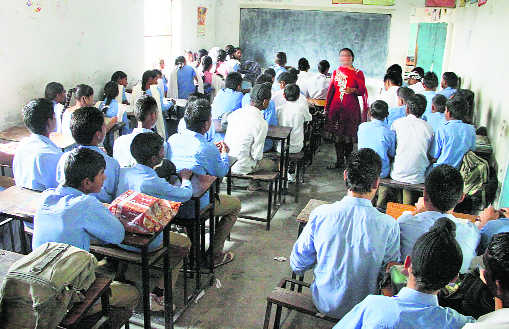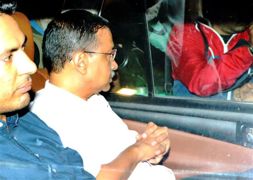
Local communities will have to take greater interest in service delivery of education.
Sukhdeep Brar
The focus is back on education in Punjab for two reasons: first, examination results are out. And spin them as we might, a 40 per cent failure rate does not mean that the window of opportunity is more or less shut only for this 40 per cent of youth. If we take the percentage of children who do not graduate past primary or lower secondary, the percentage of those falling by the wayside would exceed 50 per cent. Even among those who have passed, a large number of graduates would be almost as unfit for higher education and employment as those who have failed.
Second, the CM has reiterated his resolve to focus on education and health. For both sectors, the quality of service delivery is most important. For education, the delivery point remains the schools and performance remains a challenge. Although, on average, students from government schools have performed better than those from private schools, there are significant rural-urban differentials in performance as well as in gender parity. Children in rural schools face greater roadblocks in life than their urban counterparts.
There is a perception that government schools are being reduced to schools for Dalits and other marginalised groups. Private schools have proliferated to meet the growing demand for better education. The common perception is that they offer better education, though this may not necessarily be true. The image of a private school is of good education — the child going to a private school in a village has a neat uniform and something to show for the day in class; an exercise book has been checked. Parents can see progress every day. The teacher in the private school probably is less qualified and earns half of what a teacher in a government school earns, but is seen to be delivering better results.
It is a dilemma across the developing world: why do teachers in private schools with lower salaries produce better results? The reason is simple: accountability. In order to keep your job, you have to deliver good results and ensure that the school’s reputation is protected since it is run like a business. On the other hand, accountability in government schools is weak: absenteeism, misusing teaching hours, ill-treatment of students, etc rarely invite punishment. Jobs are secure, transfers can be “bought” and disciplinary action quashed by paying bribes.
This emerging lack of confidence in state schools has many consequences. It is a shame if education, the one medium that can ensure equity and lessen social inequalities, becomes the very medium that indirectly exacerbates the social divide. It is also a blot on Sikhism which has its strongest roots in rural Punjab that we can allow government systems to inadvertently bring about a divide based on caste, a notion rejected by the Gurus and alien to Sikh values. If Dalits are the main community left to patronise government schools, it is not because of caste considerations alone. It is due to the prevailing income inequalities that are biased towards the weaker communities who cannot afford to send their children to private schools. But the long-term social implications should not be ignored.
Punjab was one of the first states to develop a vast network of schools, including model schools, and healthcare centres in rural areas. These, along with link roads and rural electrification, were the visible markers of Punjab’s early progress. Neglect of government schools, which are often the only option in rural areas, has impeded development in villages. One of the key reasons for the development of Punjab’s villages was the strong link the Punjabi had with his rural origins. Those who left villages to take up employment in cities did not disconnect with their roots, but instead, renovated and upgraded their village homes in keeping with their improved status. Add to this the fact that the “ruling” classes — the politicians and the bureaucracy — were drawn in fairly large numbers from the Jat community, the backbone of rural Punjab. Their identity was often derived from the village to which they belonged. Many prominent personalities use their village name in lieu of their surname. It was a matter of prestige to upgrade your village home; to get a school; a health centre; a bus service; water works, etc. allocated to your village. It enhanced your own prestige as well as that of your village — a mutually complementary agenda. The early broader thrust towards developing villages can also be attributed indirectly to this link with the villages.
Why is it then that the interest in maintaining the quality of public services in villages has waned among those who can make a difference? With the passing of the older generation that was more strongly rooted in the rural areas, the well-to-do have shifted their investments as well as residences to urban areas and land is increasingly seen only as a source of biannual income. The archaic laws surrounding land ownership and management have pushed investments into non-agriculture, urban sectors. Besides, with landholdings getting smaller, the attachment to land is no longer as strong as it once was. Educated Sikh youth from rural areas who have the means are immigrating in search for better opportunities.
The backbone of Punjab is its villages. Despite the big hoardings all over Punjab heralding progress, the villages have made little progress in the past 20 years. If you engage in conversation with anyone the topic invariably turns to rampant corruption. Almost everyone speaks of corruption with awe and disgust simultaneously — implying both acceptance and condemnation. Integrity esteems seem to have lost the battle to money. Drug use among the village youth is due to lack of avenues to fulfil their dreams. Attitudes have changed little over the years, parents are still struggling to give their children an education, but are able to offer little help being themselves illiterate or semi-literate.
The system will not self-correct. The role of communities and village elders has been eroded due to politicisation of the panchayat elections. Yet, there is no better watchdog than the communities. Only the people for whom the services are provided can hold the system accountable. The educated and retired people who still have roots in villages can fill the leadership vacuum by encouraging, and even mobilising, village communities to take greater interest in service delivery of education, health and other development programmes in rural areas. The benefits to society would be immense. It is a challenge for the idealistic and the inspired to provide the leadership to restore Punjab’s pride and potential. There is no better place to start than in its schools.
The writer, a former IAS officer, recently retired from World Bank



























